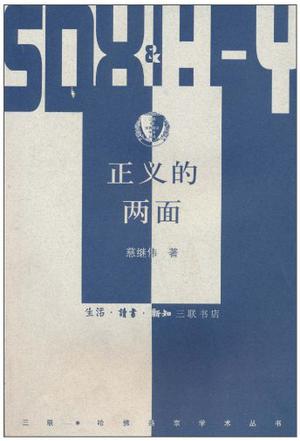-

正义的两面
正义主题乃当今国内外诸人文社会科学之聚讼焦点,其学理解释尤为国内学界所急缺。慈继伟先生积其深厚的海外博学资源与其共独到的本土道德现实体察于是书,力超康德至罗尔斯一系的西方正义伦理之规范性研究范式,自辟正义之解释性研究理路,提出并系统阐发了正义的两面性、即:个人自愿遵守正义原则之动机的有条件性与社会正义要求对个人的无条件性。 -

Moral China in the Age of Reform
Three decades of dizzying change in China's economy and society have left a tangible record of successes and failures. Less readily accessible but of no less consequence is the story, as illuminated in this book, of what China's reform has done to its people as moral and spiritual beings. Jiwei Ci examines the moral crisis in post-Mao China as a mirror of deep contradictions in the new self as well as in society. He seeks to show that lack of freedom, understood as the moral and political conditions for subjectivity under modern conditions of life, lies at the root of these contradictions, just as enhanced freedom offers the only appropriate escape from them. Rather than a ready-made answer, however, freedom is treated throughout as a pressing question in China's search for a better moral and political culture. -

正义的两面(修订版)
《正义的两面(修订版)》作者积其深厚的海外博学资源与其独到的本土道德现实体察于是书,力超康德至罗尔斯一系的西方正义伦理之规范性研究范式,自辟正义之解释性研究理路,提出并系统阐发了——正义的两面性,即:个人自愿遵守正义原则之动机的有条件性与社会正必要求对个人的无条件性。 《正义的两面(修订版)》力图超越从康德到罗尔斯一系的西方正义伦理之规范性研究范式,自辟正义的解释性研究理路,提出并系统阐发了正义的两面性,即:个人自愿遵守正义原则之动机的有条件性与社会正义要求对个人的无条件性。 名人推荐 本书出入古今中西,谦融欧美哲学风范;立论在平常间显深远,谋证于严谨中见洒脱,言说论理,简洁空灵;思路言路,别有洞开;实为近年来少有的伦理学典范之作。 ——万俊人 在当代中国社会,随着最近20年来社会变革的日渐深入,正义问题越来越成为人们亟待面对和思考的问题。本书作者从“正义感”的概念人手,提出了“正义的两面性”解释。比较以往哲学家们各执一端的做法(如,康德主正义之无条件性,而罗尔斯则反之),本书颇具独创性的理论方式将相关研究向前推进了一步。 本书论说清晰且不乏深度,既具欧陆哲学思想深邃的风格,又有英美哲学论延严谨的优长。除其独特的理论贡献之外,本书对于推进当代中国社会的道德实践亦将有所帮助。 ——粱治平 -

Dialectic of the Chinese Revolution
In a comparative philosophical perspective, Jiwei Ci provides an thought-provoking philosophical and psychological interpretation of the history of Chinese revolution from Maoist utopianism to reform-era hedonism. Ci argues against the common conception of the Maoist project as ascetic utopianism. Instead, he sees sublimated hedonism as an integral part of utopianism, and through ideological bankruptcy caused by the irreconcilable separation between reality and meaning creates nihilism, in turn leading to full-scale hedonism. Under this universalizing framework, Ci presents the materialist roots of Maoism his detour on the road to capitalism, reframes the Great Leap Forward and Cultural Revolution as struggles against the routinization or depersonalization of charisma,and even reinterprets the Democracy movement and recent anti-corruption agitation as inherently hedonistic.